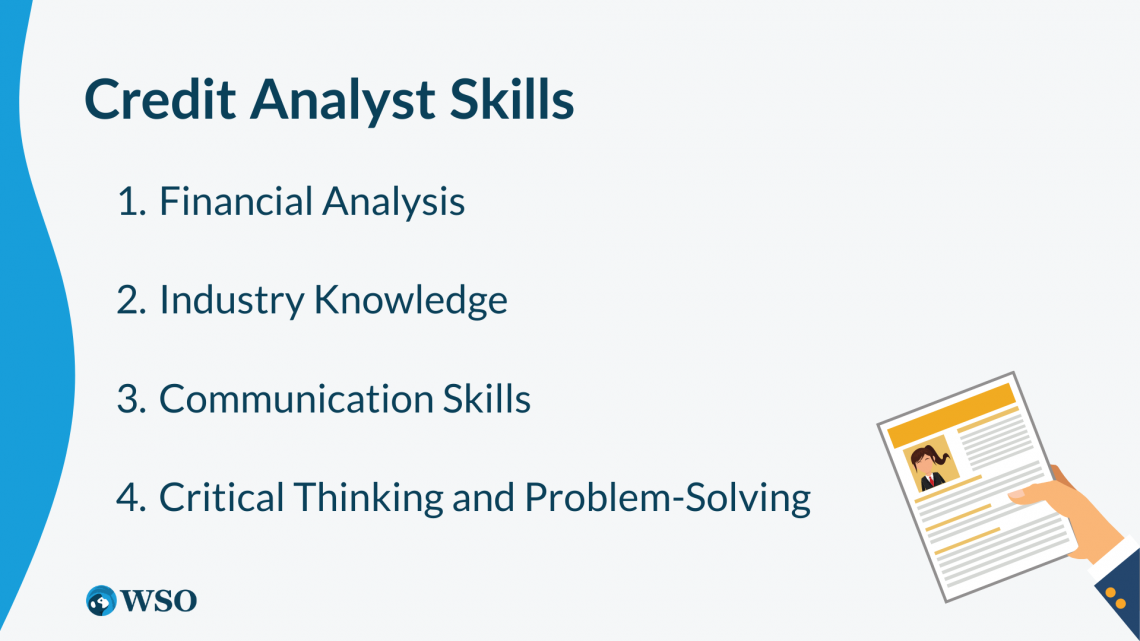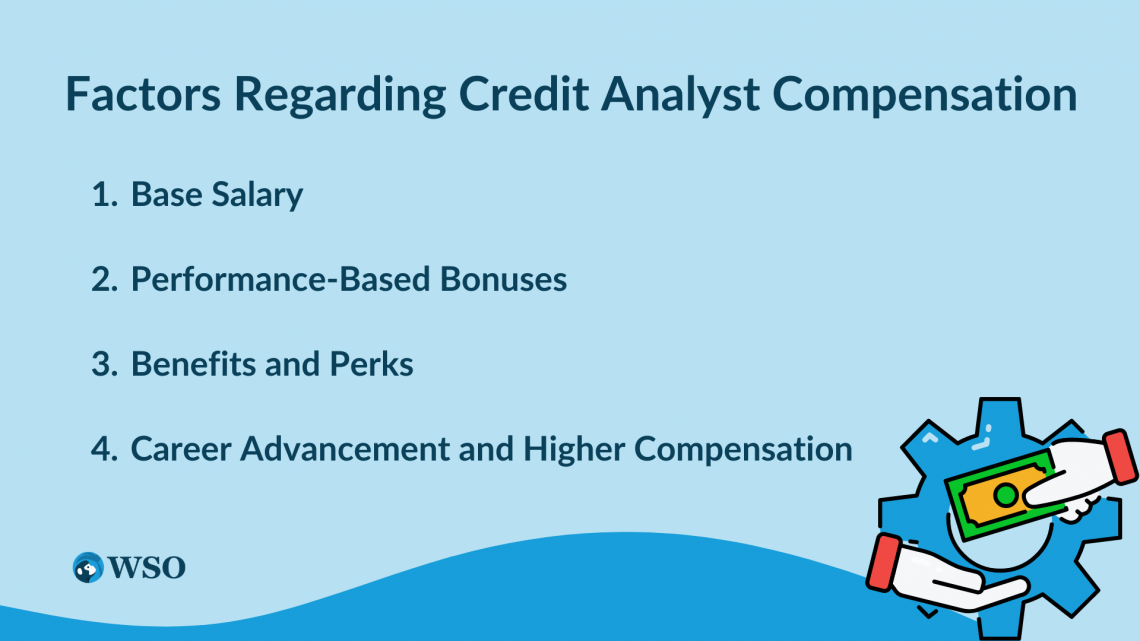Credit Analyst Career Path
It is a dynamic and evolving field that presents promising career opportunities for finance professionals.
Credit analysis is a dynamic and evolving field that presents promising career opportunities for finance professionals.

A credit analyst's role entails analyzing financial statements, reviewing credit histories, and conducting thorough research to make informed credit decisions. Continuous learning and professional development are crucial for one to go far on this career path.
Pursuing the Chartered Financial Analyst (CFA) or Financial Risk Manager (FRM) certifications can bolster the strength of your credentials, opening doors to more opportunities.
Additionally, keeping up with industry trends, regulatory changes, and advancements in credit analysis techniques will allow you to stay competitive and excel in your career path.
By understanding the career path in credit analysis, you can set clear goals, acquire the necessary skills and qualifications, and take strategic steps toward achieving long-term success.

Embracing opportunities for growth, expanding your knowledge base, and building a strong professional network will help you navigate the ever-changing landscape of credit analysis and unlock rewarding career prospects.
From breaking down the options available to provide the steps needed to get there, we will help you understand the various career paths available to a credit analyst.
Key Takeaways
- Credit analysis offers promising career opportunities for finance professionals at various stages of their careers.
- Understanding the career path in credit analysis helps individuals plan and progress toward success in the field.
- Key factors in credit analysis include analyzing financial statements, conducting thorough research, and continuous learning.
- Pursuing certifications like CFA or FRM can enhance qualifications and open doors to more opportunities.
- Keeping up with industry trends, regulatory changes, and advancements in credit analysis techniques is crucial for career advancement.
Credit Analyst Educational Qualifications
Acquiring a solid educational background is crucial to pursue a successful credit analyst career path. Covered below are the main educational qualifications you might consider:

1. Bachelor's Degree
An undergraduate degree equips aspiring analysts with the necessary knowledge and understanding of financial concepts, risk assessment, and analytical skills.
Modules that cover financial statement analysis, corporate finance, and credit analysis will equip you with the relevant knowledge for the role.
2. Specialized Courses
Supplementing your bachelor's degree with specialized courses can further enhance your qualifications as a credit analyst. Consider enrolling in courses focusing primarily on credit risk management, financial modeling, statistics, and quantitative methods.
NOTE
These courses provide practical skills and a deeper understanding of credit analysis techniques and methodologies.
3. Certifications
While not always mandatory, certifications can significantly enhance your credentials and marketability as an analyst.
The CFA designation demonstrates expertise in investment analysis, portfolio management, and financial analysis, whereas the FRM designation emphasizes risk assessment and management.
NOTE
Obtaining these certifications showcases your commitment to professional development and adds value to your resume.
4. Continuous Learning
Staying updated with industry trends, regulations, and best practices is crucial in the ever-evolving financial industry. Engage in continuous learning by attending workshops, seminars, and webinars related to credit analysis.
Subscribing to reputable financial publications and participating in industry forums can also provide valuable insights and expand your knowledge base.
NOTE
While education and certifications are essential, practical experience and skills development complement academic qualifications.
Actively seeking internships, co-op placements, or entry-level positions in credit analysis departments can provide valuable hands-on experience and further enhance your resume.
By combining a solid educational foundation with relevant coursework, certifications, and continuous learning, you can position yourself for success on your career path as a credit analyst.
Building a Solid Foundation for a Credit Analyst Career
Acquiring practical experience is a crucial step in pursuing this career path. Consider the following strategies to gain relevant experience in the industry and build a strong skill set:

1. Internships
Seek internships or entry-level positions at financial institutions, credit rating agencies, or corporate finance departments, as they provide valuable hands-on experience in credit analysis by allowing you to apply existing knowledge in real-world scenarios.
During internships, you may assist in conducting financial research, analyzing creditworthiness, and preparing credit reports under the guidance of experienced professionals.
This exposure enhances your understanding of credit analysis processes and helps you develop essential skills.
2. Rotational Programs
Some organizations offer rotational programs designed to expose aspirants to various areas of credit analysis. These programs typically span different departments or divisions, such as commercial lending, corporate credit, or risk management.
Engaging in a rotational program allows you to gain exposure to different aspects of credit analysis, broaden your knowledge base, and develop a well-rounded skill set.
NOTE
You can learn about industry sectors, credit evaluation techniques, and risk mitigation strategies through rotations.
3. Networking
Building a strong professional network can open doors to valuable opportunities in the credit analysis field.
Engage in conversations, seek mentorship, and express your interest in gaining experience.
NOTE
Networking can lead to referrals, job shadowing opportunities, or informational interviews, all contributing to your overall skill development.
4. Skill Enhancement
Focus on enhancing your skill set to become a well-rounded analyst. Develop proficiency in financial modeling, financial statement analysis, risk assessment, and industry research.
Consider taking courses or workshops that focus on credit analysis methodologies, credit risk management, and industry-specific knowledge. Continuous skill development demonstrates your commitment to the field and positions you as a competent and competitive analyst.
By actively seeking internships, participating in rotational programs, networking, and enhancing your skill set, you can gain valuable experience and develop the necessary competencies for a successful career in credit analysis.
NOTE
Remember to leverage these opportunities to showcase your analytical skills, attention to detail, and ability to make informed credit decisions
Credit Analyst Skills
Do consider honing the following key skills to establish a strong foundation for your credit career:

1. Financial Analysis
Master the art of analyzing financial statements, assessing creditworthiness, and evaluating risk factors. This entails developing proficiency in ratio analysis, cash flow analysis, and interpreting financial data.
By understanding the financial health of companies, you can make informed credit decisions and provide accurate assessments of their creditworthiness. Continually sharpen your financial analysis skills to stay updated with evolving industry standards and best practices.
Gain in-depth knowledge of specific industries to understand their unique risk factors and trends. This enables you to make more accurate credit assessments and provide insightful recommendations.
NOTE
Stay informed about industry developments, market trends, and regulatory changes that may impact the creditworthiness of companies within those industries. This industry knowledge will allow you to identify potential risks and opportunities and tailor your credit analysis accordingly.
3. Communication Skills
Effective communication is essential for credit analysts. You must be able to clearly articulate your analysis and provide recommendations concisely and persuasively to relevant stakeholders, be it superiors or clients.
Possessing good written and verbal communication skills will enable you to convey complex financial information in ways easily digested by audiences who might not possess a finance background.
NOTE
Effective communication fosters collaborative relationships with colleagues, clients, and other stakeholders, enhancing the overall impact of your credit analysis.
4. Critical Thinking and Problem-Solving
Credit analysts encounter complex scenarios and must be skilled in critical thinking and problem-solving. This involves analyzing information, identifying patterns, and drawing meaningful conclusions.
Strong problem-solving skills will allow you to navigate challenges and make logical credit decisions even in ambiguous situations.
Investing in developing these key skills will contribute to your success in this industry. Seek opportunities to practice and refine these skills through real-world projects, case studies, and ongoing professional development.
By cultivating a strong skill set, you position yourself as a competent and sought-after analyst capable of delivering valuable insights and making informed credit decisions.
Career Paths for a Credit Analyst
Numerous advancement opportunities await as you gain experience and expertise in the credit analyst field. Covered below are some roles you might consider later on in your career:

1. Senior Credit Analyst
As a senior analyst, you will handle more complex credit evaluations, tackle larger credit portfolios, and take on higher-level responsibilities.
Your expertise and seasoned judgment will be invaluable in assessing credit risk and making strategic credit decisions. Additionally, you may be able to mentor junior analysts, sharing your knowledge and contributing to their professional growth.
2. Credit Manager
Advancement to a credit manager position involves overseeing a team of credit analysts and taking on broader responsibilities in credit risk management.
The job scope of a credit manager can revolve around developing and implementing credit risk policies, ensuring that regulatory requirements are adhered to, and making strategic decisions that aim to optimize the organization's credit portfolio.
NOTE
Collaboration with other departments, such as sales or finance, to assess creditworthiness and provide recommendations aligned with the organization's objectives is also part of the role.
3. Relationship Manager
Some credit analysts transition to relationship management roles, working closely with clients to understand their credit needs, provide guidance, and maintain strong business relationships.
As a relationship manager, you will leverage your extensive credit expertise to assess client creditworthiness, negotiate terms and conditions, and provide ongoing support.
NOTE
Building and nurturing client relationships will be a key aspect as you work to understand their evolving credit requirements and proactively address their financial needs.
4. Risk Management or Underwriting
Advancement opportunities may also exist in specialized areas such as risk management or underwriting. In these roles, you will focus on assessing and mitigating credit risk on a broader scale, working closely with senior management to make informed decisions.
These positions often involve a higher level of responsibility and require a comprehensive understanding of credit risk analysis, regulatory compliance, and industry trends.
Continuously honing your skills, staying informed about industry trends, and seeking new challenges will position you for success and open doors to rewarding advancement opportunities in credit analysis.
Unveiling Compensation in the Credit Analyst Career Path
One of the important considerations for those intending to pursue the credit analyst career path is the compensation and financial rewards associated with the role. Here are some factors to understand regarding credit analyst compensation:

1. Base Salary
Credit analysts typically receive a competitive base salary that varies based on factors such as experience, qualifications, and the size and location of the employing organization. Entry-level analysts can look forward to a salary ranging from $50,000 to $70,000 in their early years.
2. Performance-Based Bonuses
Many organizations offer performance-based bonuses tied to individual and team achievements. These bonuses are often based on metrics such as the accuracy of credit assessments, portfolio performance, or meeting specific targets.
NOTE
Outstanding performance can lead to substantial bonus payouts, adding to the overall compensation package.
3. Benefits and Perks
Credit analysts often receive a comprehensive benefits package, including health insurance, retirement plans, and paid time off. Other perks may include professional development opportunities, tuition reimbursement, and employee discounts.
4. Career Advancement and Higher Compensation
Analysts can expect increased compensation as they gain experience and move into more senior roles.
Senior analysts, credit managers, or those transitioning to roles such as portfolio managers or risk managers often earn higher salaries, reflecting their elevated responsibilities and expertise. Analysts at this level of seniority can command packages ranging from $80,000 to $150,000 per year.
NOTE
Compensation structures may differ depending on the organization you work for. Commercial banks, investment firms, and credit rating agencies will likely have differing benchmarks.
As you progress in your career, continuous professional development, expanding your knowledge, and seeking opportunities to enhance your skills can contribute to higher earning potential.
Additionally, pursuing advanced certifications and specialized training can help position you for higher-level roles with greater compensation opportunities.
Conclusion
Embarking on a career as a credit analyst opens doors to immense growth and personal fulfillment. It is a field where educational qualifications, practical experience, skill development, and embracing advancement opportunities pave the way to a prosperous professional journey.

Continuously honing key financial analysis, risk assessment, and decision-making skills will further enhance your expertise and marketability.
Credit analysis offers a wide range of opportunities for career progression. Whether you aspire to climb the analyst ladder, transition to management positions, explore specialized niches, or even pursue entrepreneurial ventures, the possibilities are abundant.
Remaining adaptable, open to learning, and committed to delivering excellence will be instrumental in capitalizing on these prospects.
The allure of a career in credit analysis extends beyond the promise of professional growth. Competitive compensation packages, including attractive salaries and potential bonuses, make this field financially rewarding.
As you navigate this exciting career path, remember that this article is a general guide. Embrace the potential of a fulfilling and prosperous future as a credit analyst, where your expertise and contributions can significantly impact the financial world.









or Want to Sign up with your social account?